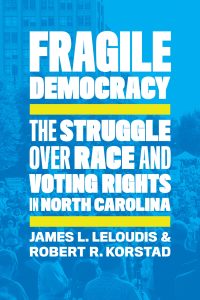
North Carolina’s voting rights battles are America’s struggles in microcosm, a new book says.
Election fraud. Gerrymandering. Disinformation campaigns. Voter suppression. A public disillusioned with the political process. A new book by two historians reminds us that some of the battles over the ballot box now playing out in North Carolina are echoing events that have occurred with alarming regularity since Reconstruction.
“This is a bad movie that runs again and again,” said James Leloudis, professor of history, Peter T. Grauer Associate Dean for Honors Carolina and co-chair of the UNC Commission on History, Race and a Way Forward. He is the author, with Robert Korstad, of Fragile Democracy: The Struggle Over Race and Voting Rights in North Carolina. Korstad is professor emeritus of public policy and history at Duke University’s Sanford School of Public Policy.
Their book (UNC Press, September 2020) opens with an overview of post-Civil War North Carolina, which bore a “Herculean share of hardship and depravation” from the conflict. Two biracial coalitions formed in the period between Emancipation and 1900. The first was in the mid-1860s and resulted in the crafting of a radically democratic state constitution. Ku Klux Klan vigilante violence followed. A second alliance, known as Fusion, emerged from the economic depression of the 1890s. It revised election law to accommodate illiterate voters, among other advancements. These reforms were met with a horrific backlash, including such incidents as the Wilmington insurrection of 1898, in which a white mob overthrew democratically elected city officials. The only coup d’état in U.S. history left more than 60 people dead.

The pattern of progress and backlash continues for another 100 years, through the passage of the landmark Voting Rights Act of 1965 and the protections it afforded, followed by court rulings and legislation in recent years that have impeded progress.
In fact, Fragile Democracy had its origins in expert witness reports that Leloudis prepared for two voting rights lawsuits: In 2013, a U.S. Supreme Court decision significantly weakened two provisions of the Voting Rights Act. Shortly after that court ruling, then-North Carolina Gov. Pat McCrory signed into law H.B. 589, which included a voter ID requirement and other changes that disproportionately affected minority voters. Leloudis compiled research for the NAACP in suits filed in both state and federal courts. Challenges to the voter ID provision and other restrictions are wending their way through the legal system.
Leloudis said the undergraduates he teaches are mostly unfamiliar with this cyclic history: “They know a little of the Civil War, they know a little of Reconstruction. … They have some familiarity with the civil rights movement of the late 1950s and 1960s. But all the stuff in between, they know very little about. And many of them get angry when they learn about it. They’ll catch me after class and say, ‘I had a very good high school education. How is it that I and so many others know so little of this story?’”
Leloudis is quick to point out that although his book focuses on North Carolina’s struggle over race and voting rights, similar events were unfolding across the nation. “The specifics are particular to North Carolina, but what we’re talking about here is the story of race in American politics.”
If he were asked in 20 years to provide an update for this book, what would Leloudis like for it to say?
“When I spend time with students and the kinds of questions they raise, I am encouraged. Twenty years from now, it would be gratifying to write a new introduction that says we’ve reckoned with the legacies of slavery and Jim Crow. We’ve come to terms with that history. And in the process, we’ve recognized that racial injustice is injustice to all.”
Learn more in a digital exhibit about the book.
By Geneva Collins
Published in the Fall 2020 issue | Chapter & Verse
Read More

‘Your only limitation is your own imagination’
Richard Watkins, program coordinator for Chancellor’s Science Scholars (CSS), shares…

U.S. Department of Energy funds solar energy research
The U.S. Department of Energy will provide $100 million in funding to new artificial photosynthesis research…


